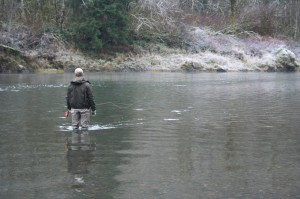December 11, 2011
By John Larison
 The Northwest has been basking in sunshine the last two weeks or so, and given the time of year, that means cold air temps. Our rivers have fallen back to early summer levels, and their banks crunch underfoot. On all the inside beaches, chinook carcasses sit high and dry and wear a plating of frost, except for the divots where a gull or raccoon recently gorged.
The Northwest has been basking in sunshine the last two weeks or so, and given the time of year, that means cold air temps. Our rivers have fallen back to early summer levels, and their banks crunch underfoot. On all the inside beaches, chinook carcasses sit high and dry and wear a plating of frost, except for the divots where a gull or raccoon recently gorged.
I was picking my way through the carcasses recently, wearing just about everything I own and still shivering, the water around my waders in the mid-thirties. I'd just seen a group of chrome steelhead in the tailout above, so I was fishing with renewed confidence. My cast landed near the far bank, a quick mend to reposition the running line, and the line came into swing. I longed for the thermos of coffee in the boat.
Just then, the rod forked, and straightened.
A fish had taken, but missed the hook. And just like that, the day felt balmy.
Advertisement
I made a similar cast, this time slowing the swing a little, and just as they fly reached the same bucket, I felt a solid grab. This time, the grab lead to a squealing reel. The fish rolled on the far bank, then turned and burned down the length of the run, somersaulting end over end--chrome and over ten pounds. The fish wanted to hold behind a midstream boulder, so I gave it a wide belly of line, which exerted pressure from below. It charged upstream, toward me, and after another short run, it came near enough I could tail her. 12 pounds, and my first winter run of the year.
What happened next revealed an important lesson of fishing to fresh run steelhead.
Three casts later, I saw a wake tracking my fly into the shallows. The wake turned into a marlin--a miniature sailfish fin up and above the surface; the steelhead swirled on the fly but missed. So I made the same cast again, this time mending to slow the swing. The fly was broadside and coming right through the bucket when the fish crushed it, heading back to the ocean now.
Advertisement
These grabs came a hundred yards from the a tailout where I'd seen six or eight steelhead holding, every one dime bright and active. Unfortunately, my boat sent them scattering. But these were the first fish I'd seen in four miles of floating. And now I'd had a handful of grabs just downstream.
So I fished deeper into the run than I might have normally, working the fly to allow it to swing all the way to my bank. These were bright fish, I reasoned, and they might be holding in the shallows right on shore. I'd gone another fifty casts when my line came to an abrupt stop. It wasn't a "grab" so much as a "taking possession"--this whatever-it-was now owned my fly. My first thought was LOG. When the thing moved, I thought DARK CHINOOK. But then its tail fin punched through the surface, I realized that this was a fish as bright as the others, only much, much bigger.
It dogged me in the pool like big fish often do, daring me to horse it toward shore. When I gave him the wood, he thrashed and bucked like a wild horse in a small corral. Twice I brought him onto the pebbled beach, his body from the top of his pectoral fin up exposed to the air, and twice he charged back into the meat of the run. Finally though he came into the shallows and fell onto his side and I rushed forward to tail him. He taped out at 17 pounds, and had sea lice behind his fins.
The air felt seventy-degrees now, and my breath steamed the space between us.
For rest of the day--and three more river miles--I didn't see another steelhead. In that entire float, at least according to my observations, only one pool held fish.
Which, according to my friends, is common in the early days of a run, summer or winter. The steelhead are entering the river in pulses, twenty fish now, ten fish tomorrow. They'll move in a school, following each other out of a pool and into the tailout above. Eventually they disperse: a fish here, a fish there. But for those first days, they operate more or less as a unit.
So if you find a bright fish this December, consider giving the pool another pass. The second time, at least, you'll be a little warmer than the first.

